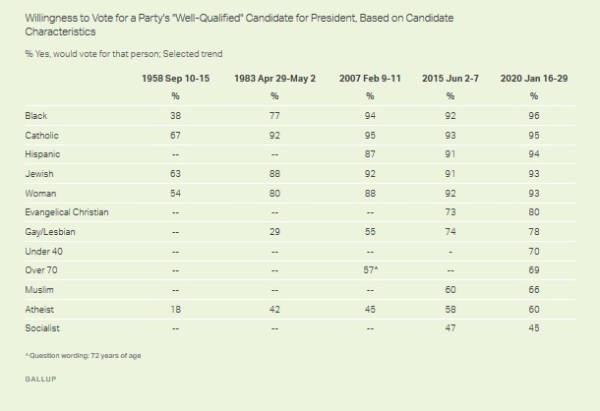Last week was so busy, our Monday news roundup had to wait until Tuesday. What did you miss? Wacky takes on coronavirus? Trump dumping charter schools? Darwin Day? Christian college closing? How about the new poll numbers about socialist “electability?” Read on!
From the Right: Kooky takes on the coronavirus:
- President Trump: “The virus that we’re talking about having to do, a lot of people think that goes away in April, with the heat, as the heat comes in, typically that will go away in April.”
- Jim Bakker (yes, that Jim Bakker): My “silver solution” takes care of coronaviruses.
- Omaha pastor: Do not fear coronavirus. Trumpism has shielded the USA.
Tough times at Texas State, at CHE.
Davis-Williams, who is black, said one of the conservative students mocked him by saying he didn’t “belong” there. He walked closer to respond, but the student hid behind campus police officers gathered at the scene.
That’s when an officer stopped Davis-Williams — and told him to quit walking in that direction.
Another Christian college shuts its doors, at OL.
Tom Ries, who took the post of interim president in early January, said Concordia’s enrollment plummeted from more than 8,000 four years ago to around 5,000 currently. He said the university has a “significant” debt load and faced significantly higher costs in the coming year.
The shutdown came suddenly. Just last Tuesday, Concordia staged a flashy event that raised $355,000 for its an innovative program with Portland Public Schools. The first some staff and faculty heard anything about a shutdown was when it was announced to them at 9 a.m. Monday. Students got the word an hour later.
Trump’s budget plan cuts funding for education, at Politico.
…and it specifically cuts federal funding for charter schools, at Curmudgucation.
The Trump budget completely axes federal support for charter schools, rolling the federal money for charters into a big fat all-purpose block grant, a big chunk of money retrieved from various programs that have been deemed redundant and ineffective. States will now get a big pile of money that they can spend on a loosely defined bunch of Education Stuff. If they want to spend some of that on charter schools, they can.
What does Trump’s proposed ed budget say? Review at Chalkbeat.
The Trump administration proposed a major reduction in federal education spending Monday that would eliminate nearly 30 standalone programs, including ones that support homeless students, rural students, English learners, and magnet schools.
Perhaps most surprisingly, the proposal would effectively axe a long-standing federal program that has catalyzed charter school growth across the country.
The department packaged this move as part of a bigger effort to give states more decision-making power.
How are charter-school leaders taking the news? Not well, at WaPo.
The hardest electoral positions? “Socialism” or “atheism,” says new Gallup poll.
 Where are the great TV shows about teachers? At WaPo.
Where are the great TV shows about teachers? At WaPo.
Shows such as “Parks and Recreation,” “Scrubs,” “The Office,” and “Silicon Valley” balance humor with heart and genuine insight. Even through the absurdity, something about the work world these shows create rings true. Not so much with TV teachers.
Darwin Day was Feb. 12. National Center for Science Education collected a series of statements: Why Teach Evolution. You can see them all here.
Teaching and discussing evolution opens so many doors to scientific inquiry and understanding. The very heart of what science is, and is not, is captured in conversations about how we know evolution is happening at the micro and macro levels, the inability of science to consider the metaphysical as an explanation of events, and the nature of science as self-correcting in light of evidence.














